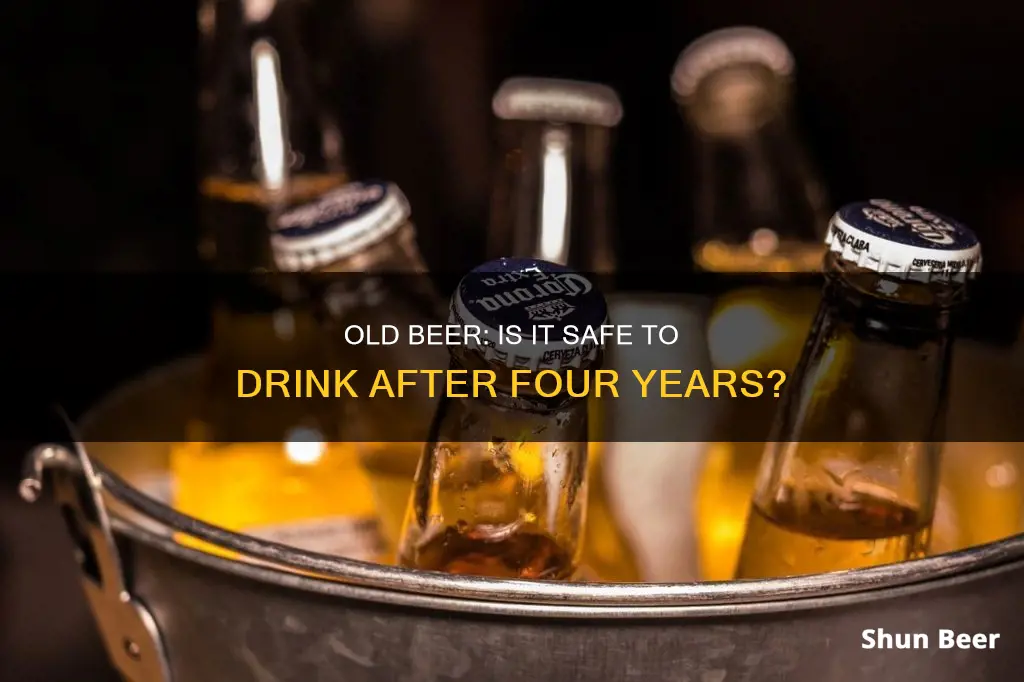
Drinking old beer is a topic of interest for many beer enthusiasts. While it is generally safe to consume beer past its best before date, the flavour and taste profile of the beer will change over time. Proper storage is essential to preserving the quality of the beer, as light and fluctuating temperatures can negatively impact its flavour. Low-gravity beers, such as pale low-alcohol lagers, tend to stale faster and may only last for up to six months to a year. On the other hand, high-gravity beers like barley wines and imperial stouts can benefit from ageing, developing richer flavours as they slowly oxidize. Ultimately, while drinking a four-year-old beer may be safe, the sensory experience may vary depending on the original style of the beer and the storage conditions it was subjected to.
| Characteristics | Values |
|---|---|
| Safe to drink | Yes |
| Tasty | No |
| Harmful | No |
| Cause sickness | No |
What You'll Learn

Old beer is safe to drink
However, beer does slowly change over time. Low-gravity beers will start to taste stale more quickly than high-gravity beers. If kept refrigerated, low-gravity beers may still be drinkable after six months, but they will begin to taste very stale after seven years. High-gravity beers like barley wines or imperial stouts benefit from slow oxidation, acquiring richer flavours over time. Belgian styles, like lambics, also age well as the wild yeasts and bacteria continue to grow.
Proper storage is important to ensure that beer stays drinkable for as long as possible. Beer should be stored in a cool, dark place as light is the real enemy of beer. Clear glass provides no protection against light, and even green glass only blocks around 40% of light. Brown glass is best, blocking about 90% of light, but completely opaque materials are the most effective for blocking light. Fluctuating temperatures can also negatively impact beer, so it's best to store beer in a place with a consistently cool temperature.
The Science Behind Beer Koozies: Do They Really Work?
You may want to see also

It's unlikely to taste good
It's unlikely that a 4-year-old beer will taste good. Beer slowly changes over time, and while some beers benefit from ageing, low-gravity beers tend to taste stale more quickly. Beers with high alcohol content, such as barley wines or imperial stouts, can acquire richer flavours as they slowly oxidise. However, even these beers have a limit, and eventually, they will begin to taste stale.
Low-gravity beers will last for a shorter period. If kept refrigerated, they may last for up to 6 months, but 4 years is likely to be too long. Beers with lower alcohol content will begin to taste stale much more quickly, and a beer that was low on flavour to start with is unlikely to improve with time. You may experience a "wet cardboard" taste, caused by the breakdown of oils and sugars in the beer, along with other chemical changes.
The type of bottle can also make a difference. Clear glass bottles provide no protection from light, and beer left in the sun for a day will taste skunky. Green glass provides some protection, but not much, blocking around 40% of light. Brown glass is the best, blocking around 90% of light.
The Magic Behind Beer Ripples: How Does It Work?
You may want to see also

It won't make you sick
Drinking 4-year-old beer will not make you sick. Beer has a low enough pH that no known pathogens can survive in it, which is why it stays drinkable much longer than other foods and drinks. This is also why you never hear about botulism problems with home-brewed beer like you do with home-canned foods.
The alcohol, hops, and yeast in beer act as preservatives. Historically, beer was safer to drink than water, and the Pilgrims survived the journey across the Atlantic because they drank beer.
However, 4-year-old beer may not taste very good. Beer slowly changes over time, and even those that benefit from ageing have a limit. High-gravity beers like barley wines or imperial stouts acquire richer flavours as they slowly oxidise, and wild yeasts and bacteria in Belgian styles like lambics continue to grow. But low-gravity beers can start to taste stale much more quickly.
If your 4-year-old beer has been stored in a cool, dark place, it may still be drinkable. However, if it has been exposed to light or fluctuating temperatures, it is more likely to have gone stale.
Beer Tastes Better After a Good Workout: Why?
You may want to see also

It's not harmful
Drinking 4-year-old beer is not harmful to your health. Beer is a perishable product that stales when exposed to light, oxygen, and heat, which degrade the organic compounds responsible for its taste and smell. However, even when its flavour declines, it remains safe to drink. This is because most beer is pasteurised or filtered to eliminate bacteria, making it highly resistant to spoiling.
The taste of beer does change over time, however. Beers with higher alcohol content, such as barley wines or imperial stouts, acquire richer flavours as they oxidise. Beers with lower alcohol content begin to taste stale more quickly.
While drinking old beer is not harmful, it may not be a pleasant experience. One source describes the taste of a year-old beer as "distinctly malty, sweet, and [...] flat". Another source says that old beer will taste "off".
The speed of the ageing process depends on the alcohol content of the beer and how it is stored. Refrigeration slows the process, so beer should always be stored in a cool place. Beers with higher alcohol content have a longer shelf life.
Do Sulfite Wands Really Work for Beer?
You may want to see also

It's drinkable if stored in a refrigerator
Beer is an organic substance, and as such, it begins to decay as soon as it is brewed. This decay is accelerated by heat, so storing beer in a refrigerator can slow this process. The ideal temperature for storing beer is between 45 and 55 degrees Fahrenheit, which is slightly warmer than a standard refrigerator. However, storing beer in a refrigerator is still better than storing it at room temperature.
The rate at which beer spoils depends on several factors, including the type of beer, the container it is stored in, and the bottling time. Lighter beers with lower alcohol content, such as pale ales, wheat beers, and lagers, are best consumed within three months of packaging. Heavier beers like stouts and porters can last up to six months. The container that the beer is stored in also affects its shelf life. Beer stored in cans generally lasts longer than beer stored in bottles, as cans do not let in light and provide a more complete seal against air.
While old beer may not taste as good as fresh beer, it is unlikely to be harmful to drink if it has been stored in a refrigerator. One source mentions a beer that was still drinkable after 15 years, although the taste was not great. Another source mentions that the Pilgrims drank beer on their journey across the Atlantic, as beer stays drinkable longer than water due to the alcohol and hops acting as preservatives. However, it is important to note that the taste of beer will change over time, and even a few months of aging can significantly impact the flavor.
In conclusion, while storing beer in a refrigerator may not keep it drinkable for four years, it will definitely extend its shelf life compared to storing it at room temperature. The ideal storage temperature for beer is slightly warmer than a standard refrigerator, but even a standard refrigerator will help to slow the decay process and keep the beer drinkable for longer.
Breaking into the Beer Industry: A Guide to Success
You may want to see also
Frequently asked questions
No, it is not dangerous to drink beer that is 4 years old. The pH level of beer is low enough that no known pathogens can survive in it.
It is likely that a beer that old will taste stale, or like cardboard or vinegar. However, some beers are designed to be aged, and some people enjoy the taste of old beer.
Beer that is stored in clear or green glass bottles is more likely to taste bad due to exposure to light. Beer that is stored in brown bottles or opaque materials is less likely to be affected. Fluctuating temperatures can also affect the taste.
Yes, it is safe to drink beer that is past its "sell by" date. The "sell by" date is more of a guideline than a hard-and-fast rule, and beer can last for much longer than the date listed.







